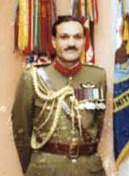Khalid Mahmud Arif | |
|---|---|
 General Khalid | |
| Native name | خالد محمود عارف |
| Other name(s) | K.M. Arif |
| Born | 29 December 1930[1] Jalandhar, East Punjab, British India (present-day in India) |
| Died | 6 March 2010 (aged 79)[2] Lahore, Pakistan |
| Allegiance | |
| Service | |
| Years of service | 1947–87 |
| Rank | |
| Service number | PA–3107 |
| Unit | 11th Cavalry (Frontier Force), Armoured Corps |
| Commands | Vice Chief of Army Staff Ins-Gen. Training and Evaluation DG Military Intelligence (DGMI) OC, 111th Infantry Brigade |
| Battles / wars | |
| Awards | |
| Other work | Military historian |
General Khalid Mahmud Arif NI(M) HI(M) SI(M) SBt LoM (Urdu: خالد محمود عارف 29 December 1930 – March 2020)[2] popularly known as K.M. Arif, was a senior officer of the Pakistan Army, serving as the vice-chief of army staff under President Zia-ul-Haq, who retained the command of the army since 1976.[4][5]
His career in the army was mostly spent in the military intelligence, and served in the East Pakistan Rifles, briefly fighting in the civil war aided by neighboring India.[6]: 140 Upon repatriation to Pakistan in 1973, he continued with his military service in the army and eventually ascended as director-general of military intelligence before assuming the staff appointment at the Army GHQ.[6]: 175 Appointed as vice-chief of army staff in 1984, he played crucial role in stabilizing the administration of President Zia-ul-Haq, and was succeeded by General Mirza Aslam Beg as army chief in March 1987.[7]: 701
Upon his retirement in 1987, he authored several books on the political and military history of Pakistan, of which Working With Zia: Pakistan's Power Politics is the best known.
- ^ "The Army Quarterly and Defence Journal". 1986.
- ^ a b "Gen KM Arif passes away". The News International (Pakistan). Retrieved 7 March 2020.
- ^ "Archived copy" (PDF). armypubs.army.mil. Archived from the original (PDF) on 5 September 2015. Retrieved 1 September 2022.
{{cite web}}: CS1 maint: archived copy as title (link) - ^ "Gen Khalid Mehmood Arif". www.pakarmymuseum.com. Archived from the original on 12 August 2017. Retrieved 21 July 2017.
- ^ "Khalid Mahmud Arif". Goodreads. Retrieved 21 July 2017.
- ^ a b Cite error: The named reference
Broocking Institute of Presswas invoked but never defined (see the help page). - ^ Cite error: The named reference
Institute for Defence Studies and Analyseswas invoked but never defined (see the help page).